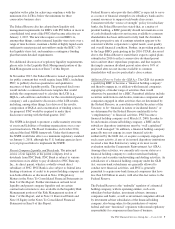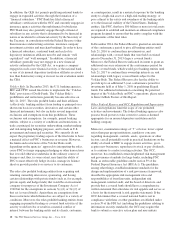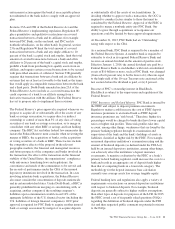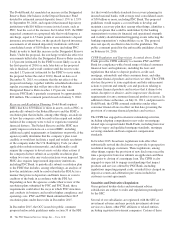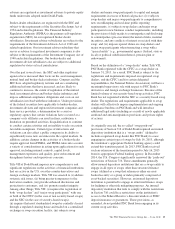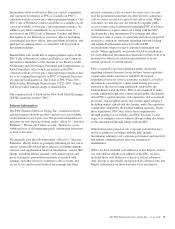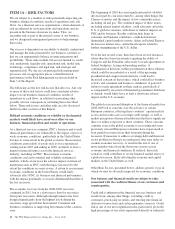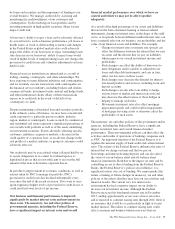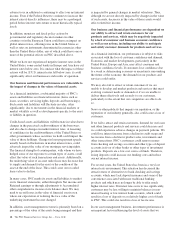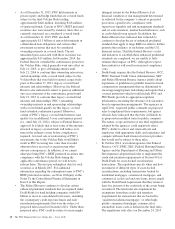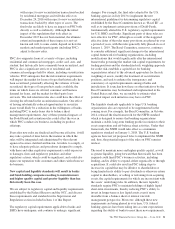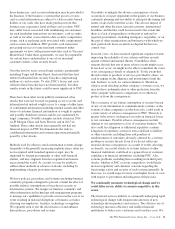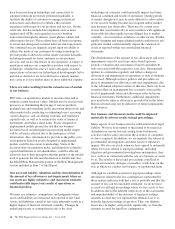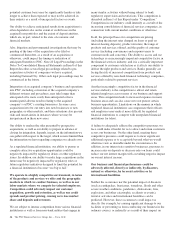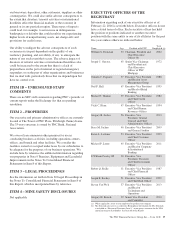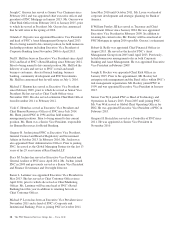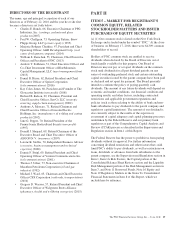PNC Bank 2015 Annual Report Download - page 37
Download and view the complete annual report
Please find page 37 of the 2015 PNC Bank annual report below. You can navigate through the pages in the report by either clicking on the pages listed below, or by using the keyword search tool below to find specific information within the annual report.manage. Poor investment performance could impair revenue
and growth as existing clients might withdraw funds in favor
of better performing products. Additionally, the ability to
attract funds from existing and new clients might diminish.
Overall economic conditions may limit the amount that
customers are able or willing to invest as well as the value of
the assets they do invest. The failure or negative performance
of products of other financial institutions could lead to a loss
of confidence in similar products offered by us without regard
to the performance of our products. Such a negative contagion
could lead to withdrawals, redemptions and liquidity issues in
such products and have a material adverse impact on our
assets under management and asset management revenues and
earnings.
As a regulated financial services firm, we are subject to
numerous governmental regulations, and the financial
services industry as a whole is subject to significant
regulatory reform initiatives in the United States and
elsewhere.
PNC is a bank holding company (BHC) and a financial
holding company and is subject to numerous governmental
regulations involving both its business and organization.
Our businesses are subject to regulation by multiple banking,
consumer protection, securities and derivatives regulatory
bodies. Applicable laws and regulations restrict our ability to
repurchase stock or to receive dividends from subsidiaries that
operate in the banking and securities businesses and impose
capital adequacy requirements. PNC’s ability to service its
obligations and pay dividends to shareholders is largely
dependent on the receipt of dividends and advances from its
subsidiaries, primarily PNC Bank. The Federal Reserve
requires a BHC to act as a source of financial and managerial
strength for its subsidiary banks. The Federal Reserve could
require PNC to commit resources to PNC Bank when doing so
is not otherwise in the interests of PNC or its shareholders or
creditors.
Applicable laws and regulations restrict permissible activities
and investments and require compliance with provisions
designed to protect loan, deposit, brokerage, fiduciary, mutual
fund and other customers, and for the protection of customer
information, among other things. We are also subject to laws
and regulations designed to combat money laundering,
terrorist financing, and transactions with persons, companies
or foreign governments designated by U.S. authorities.
Starting shortly after the beginning of the financial crisis in
2007, we have faced, and expect to continue to face for the
foreseeable future, increased regulation of the financial
services industry as a result of initiatives intended to promote
the safety and soundness of financial institutions, financial
market stability, the transparency and liquidity of financial
markets, and consumer and investor protection. We also
expect, in many cases, more intense scrutiny from bank,
consumer protection and other supervisors in the examination
process and more aggressive enforcement of laws and
regulations on both the federal and state levels. Compliance
with regulations and other supervisory initiatives will likely
increase the company’s costs and reduce its revenue, and may
limit the company’s ability to pursue certain desirable
business opportunities. New reforms will also introduce
additional legal risk (including as a result of newly applicable
antifraud and anti-manipulation provisions and private rights
of action) and affect regulatory oversight, applicable capital
and liquidity requirements, and residential mortgage and other
consumer financial products. The consequences of
noncompliance with applicable laws and regulations can
include substantial monetary and nonmonetary sanctions as
well as damage to our reputation and businesses.
A number of reform provisions are likely to significantly
impact the ways in which banks and BHCs, including PNC, do
business. Some of the reform initiatives have led to the
formation of new regulatory bodies, such as the CFPB, which
has authority to regulate consumer financial products and
services sold by banks and non-bank companies and to
supervise banks with assets of more than $10 billion and their
affiliates for compliance with federal consumer protection
laws. Other agencies have significant new powers relevant to
PNC, such as the authority now held by the CFTC to regulate
non security-based swaps, which, among other things, led
PNC Bank to register with the CFTC as a swap dealer in early
2013.
See Supervision and Regulation in Item 1 of this Report for
more information concerning the regulation of PNC and
recent initiatives to reform financial institution regulation,
including some of the matters discussed in this Risk Factor.
Note 19 Regulatory Matters in the Notes To Consolidated
Financial Statements in Item 8 of this Report also discusses
some of the regulation applicable to PNC.
The following describes the key risks associated with some of
the initiatives recently undertaken as part of the regulatory
reform initiatives affecting the financial services industry,
either where pending rules have not yet been finalized or
where the impact of new rules has not been substantially
realized.
• In December 2013, the U.S. banking agencies, the
SEC and the CFTC adopted final rules implementing
the Volcker Rule provisions of Dodd-Frank. The
Volcker Rule prohibits banks and their affiliates from
engaging in proprietary trading and acquiring and
retaining ownership interests in, sponsoring, or
having specified other financial relationships with
certain types of private funds (referred to as covered
funds), unless the activity qualifies for an exemption
or exception under the Rule. We discuss the Volcker
Rule in the Supervision and Regulation section
included in Item 1 of this Report. PNC discontinued
its designated proprietary trading operations several
years ago.
The PNC Financial Services Group, Inc. – Form 10-K 19


